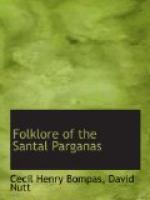Jhalka. A boastful man.
Jogi or Jugi. A religious ascetic, a mendicant.
Lota. A small brass water pot.
Lakh. One hundred thousand.
Mahadeo. The great god, i.e. Siva.
Mahajan. A moneylender.
Mahuli. A tribe akin to the Santals, basket makers by profession.
Malhan. A cultivated leguminous plant.
Manjhithan. The little pavilion in the centre of every Santal village at which the spirits of dead headmen are worshipped and where village councils are held.
Mantra. An incantation, sacred or magic formula.
Marang Burn. The great spirit, the original chief god of the Santals.
Marwari. A trader from Rajputana and the adjoining parts.
Maund. A weight, 40 seers or 82 pounds.
Meral. A small tree. Phyllanthus emblica.
More Turuiko. Lit.: The five or six—certain Santal godlings.
Mowah. A tree, Bassia latifolia, the fleshy flower is eaten and spirit is distilled from it.
Musahar. A semi-aboriginal caste which catches and eats rats.
Nala. A water course with steep banks.
Narta. The namegiving ceremony observed three or five days after birth, by which the child is formally admitted into the tribe.
Ninda Chando. The moon godess, wife of Singchando the Sun god.
Kat. A dry measure used for grain.
Kisar Bonga. A spirit which takes up its abode in the house, frolicsome and mischievous.
Kisku. One of the twelve exogamous septs of Santals, by tradition it was formerly the royal sept.
Koeri. A cultivating caste of Hindus.
Kora. A youth or young man, the hero of a story is often called so throughout, and I have for convenience adopted it as a proper name.
Kos. A measure of distance, two miles.
Ojha. An exorcist, a charm doctor, one who counteracts the effects of witchcraft.
Pachet. A place in the Manbhum district which the Santals occupied in the course of their immigrations.
Panchayat. A council primarily of five which meets to decide a dispute.
Pagri. A cloth worn round the head, a turban.
Paharia. A hill man; the Saurias or Male of the Rajmahal hills.
Pai. A wooden or metal measure containing half a seer.
Pan. Betel used for chewing.
Parganna. A Santal chief having jurisdiction over a number of villages.
Paranic. The assistant headman of a village.
Parrab. A festival.
Peepul or pipal. A tree, ficus religiosa.
Pilchu Haram and Pilchu Budhi. The first man and woman.




